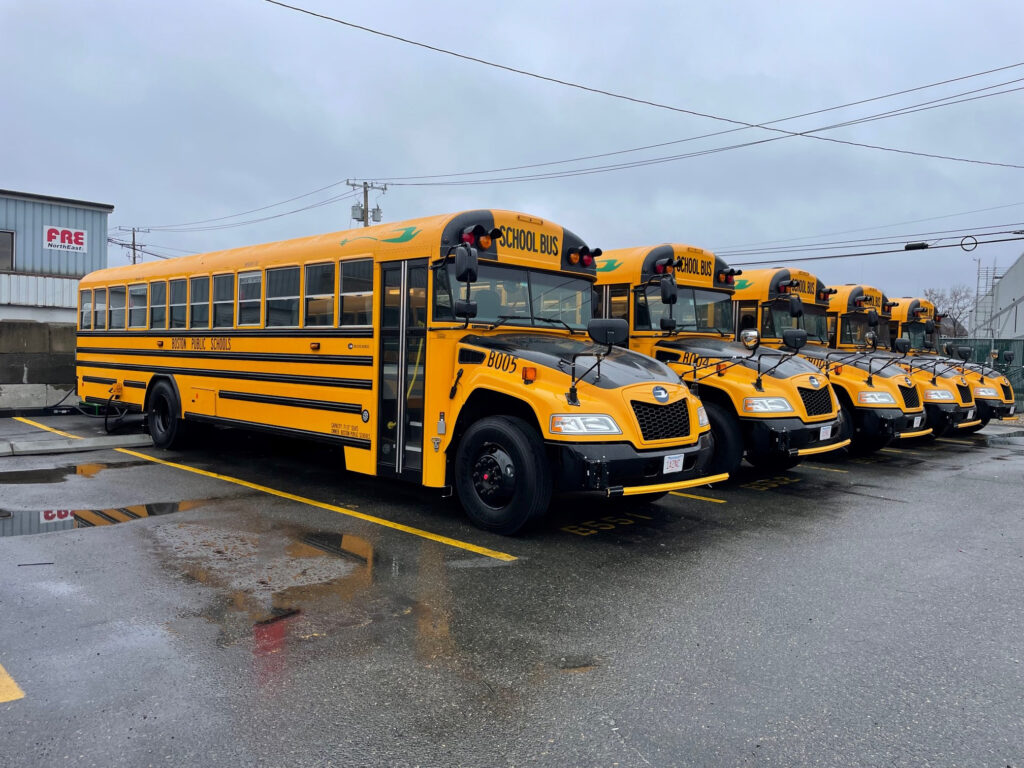Boston Public Schools Puts First 20 Blue Bird Electric Buses in Operation
Pilot Program is First Step to Convert Entire BPS School Bus Fleet of 750 Vehicles to Electric by 2030
Blue Bird Corporation electric and low-emission school buses, in conjunction with its dealer Anderson Blue Bird Bus Sales of New England, has delivered its first batch of 20 electric school buses to Boston Public Schools (BPS). School officials and local government leaders hail the groundbreaking pilot program as the largest electric school bus deployment in the Northeast. Spearheaded by Boston Mayor Michelle Wu, the transition to electric vehicles will help BPS to significantly reduce harmful greenhouse gas emissions while improving student and community health.
Boston Public Schools recently put 20 advanced Blue Bird Vision electric buses into service. The school buses can carry a maximum of 71 students for up to 120 miles on a single charge. The vehicles take approximately four hours to charge from 0% to 100% based on BPS’s Level III ICE 30 kW fast chargers installed at their Readville, MA bus depot. Blue Bird’s zero-emission buses now transport over 2,500 students safely and reliably to and from 42 local-area schools every day.
“We are thrilled by this historic partnership. This pilot program is an important step in our work towards a fully electric fleet by 2030, as part of the Green New Deal for Boston Public Schools,” said Mary Skipper, Superintendent for Boston Public Schools. “These buses are quieter, cleaner, and are an essential part of reducing BPS’ carbon footprint and creating a healthier city. Putting the needs of our young people first is central to our mission. Clean, reliable buses that get our students to school reliably, while also cutting down on pollutants in the air and reducing carbon emissions is an important step that we must take for the well-being of Boston’s young people and their future.”
“Our students enjoy riding on our new electric buses. They love the quiet drive. We all love that our students, drivers and school staff are not being exposed to any exhaust fumes generated by traditional, diesel-powered buses. In addition, our bus drivers have had positive feedback about vehicle performance,” said Jackie Hayes, Assistant Director of Contract Operations and Fleet for Boston Public Schools. “Our pilot program marks an important step toward the electrification of our entire school bus fleet by 2030 to significantly reduce harmful greenhouse gas emissions.”
“Blue Bird is recognized as a technology leader and innovator of zero-emission school buses in North America,” said Britton Smith, Senior Vice President of Electrification and Chief Strategy Officer for Blue Bird Corporation, which has more than 950 electric-powered school buses in operation today. “We are excited to add 20 electric vehicles to Boston Public Schools’ bus fleet and to further help the school district to put student and community health first.”
Boston Public Schools has relied on Anderson Blue Bird Bus Sales of New England for more than 10 years to help meet its student transportation needs and maintains a fleet of nearly 750 buses, approximately a third which are diesel powered. The school district acquired the electric buses for the pilot program from Anderson Blue Bird Bus Sales of New England, a family-owned and -operated dealership serving the region since 1961.
“Being on the ground floor with Boston Public Schools, the City of Boston and Transdev, BPS’s maintenance and operations contractor, to initiate this pilot project and see it through to this recent deployment is something special for all our team members that made this a success,” said Jim Anderson, Vice President of Anderson Blue Bird Bus Sales of New England. “BPS’s transition from a diesel to a propane and now an electric powered fleet demonstrates the commitment the Boston Public Schools and The City of Boston has undertaken to provide a cleaner, more sustainable environment within the city boundaries: Boston EV Strong.”
Boston Public Schools anticipates benefiting from significant cost saving opportunities by reducing or eliminating the fuel and maintenance costs tied to traditional diesel powered vehicles. Select Blue Bird customers reported fuel costs of up to 49 cents per mile for their diesel buses, compared to an average 14 cents per mile in energy costs for electric buses.
Category: Electric Vehicles, Engines & Drivetrains, Equipment, Featured, Fuel & Oil, General Update, Green, News, Safety, Tech Talk, Transit News, Vehicles











